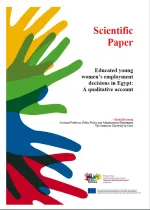Educated young women’s employment decisions in Egypt: A qualitative account

SAHWA Scientific Paper nº. 13
Despite decades of increased access to education, women’s conspicuous absence from the labour market in Egypt, and the Middle East in general, has been the focus of a large body of research. These studies have often focused on the role of culture and the regional political economy trajectory in curbing the potential of women’s participation in the labour market. This study seeks to address the interplay of social policies, family and culture in defining women’s employment decisions in Egypt. Building on the stock of evidence on women’s employment in Egypt, this study provides qualitative data through in-depth interviews with both married and unmarried working women in Egypt to explicate this process. In their own voices, the study documents the torrent of challenges educated women face as they venture into the labour market. Single women highlighted job scarcity and job quality challenges pertaining to low pay, long hours, informality, and workplace suitability to gender norms as key challenges. For married working women, the conditions of the work domain are dwarfed by the other challenges of time deprivation and weak family and social support. The paper highlights women’s calculated and aptly negotiated decisions to either work or opt out of the labour market within this complex setting. The analysis emphasises the role of social policies in the domains of employment, social security, housing and education in this process; and how inhospitable working conditions and compromised support often make opting out a sensible decision. This, in turn, augments regressive values of female domesticity. The paper urges serious discussion of women’s employment as an area for policy action not just culture.
DOI: doi.org/10.24241/swsp.2017.13.1